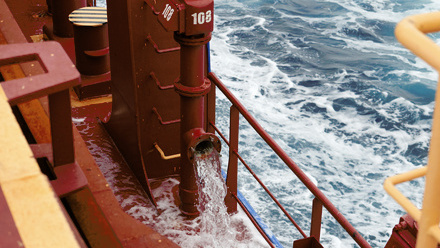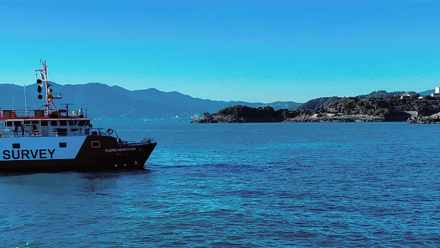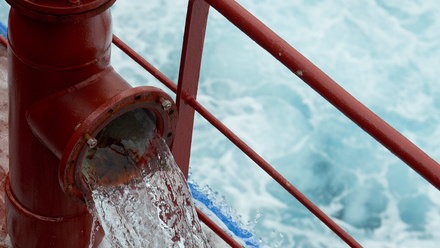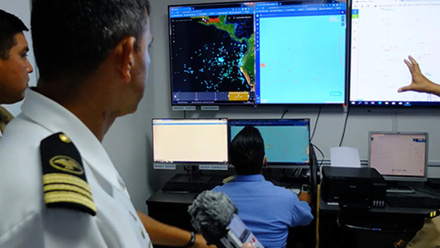The Global Fisheries Improvements SIG
Commercial fishing is the most hazardous industry in the world, killing an estimated 32,000 workers each year.
Now, the lack of an effective legislative framework for the sector has led the IMarEST to set up an expert committee that will examine the issues, propose policy, and push governments to act. We find out more from the new SIG chair, Eric Holliday.
Commercial fishing provides a source of income for more than 800 million people around the world, yet it remains an industry riddled with practices that threaten the wellbeing of the very workers and environment it relies on.
Surprisingly, there is still no uniform implementation or enforcement of its regulations, leading to widespread illegal, unregulated and unreported fishing that harms fish stocks and coastal communities, puts crews’ lives at risk, and undermines efforts to prevent the over-exploitation of marine resources.
"Research undertaken by the Food and Agriculture Organization of the United Nations estimates around 32,000 fatalities in the commercial fishing sector each year globally."
To deal directly with these pressing issues, the IMarEST recently set up the Global Fisheries Improvements Special Interest Group (SIG) – a committee of experts in fisheries science, management, and governance, that will examine and address the key challenges currently surrounding commercial fishing.
The new SIG will enable the IMarEST to provide targeted support for fisheries professionals and contribute to international initiatives that aim to improve management practices.
It will also promote best practice for managing sustainability, health and safety, working conditions and environmental challenges, and offer new opportunities for professional development.
Death and injury is rife
The Global Fisheries Improvements SIG is chaired by New Zealand-based Eric Holliday FIMarEST, who is also CEO of the FISH Safety Foundation, an international non-profit organization dedicated to improving safety outcomes in the commercial fishing industry through the provision of practical education and access to resources, and promoting a positive safety culture.
“Commercial fishing makes a vital contribution to global nutrition and food security,” he explains, “but it remains one of the most dangerous occupations in the world. And although it is big business, a great deal of it takes place in an unregulated, and often illegal, environment.
“The latest research, undertaken by the Food and Agriculture Organization of the United Nations, estimates there are now around 32,000 fatalities in the commercial fishing sector each year globally, yet incidents of death and injury are grossly under-reported, and there are no official databases logging them.
“There is also a severe lack of understanding of the detrimental health issues directly related to working in commercial fishing – from hearing disorders and substance abuse to melanoma, mental illness and suicide.
“If our new SIG can help get the Cape Town Agreement ratified, that would be a great start. The IMarEST has the potential to send out that message, and to put pressure on the governments of the world to sign up and commit to it.”
Cape Town Agreement
The 2012 Cape Town Agreement (CTA), which has been adopted by the International Maritime Organization (IMO), outlines mandatory minimum standards relating to sea-going fishing vessels of 24m in length and over. This covers their design, construction, equipment, stability, seaworthiness, machinery, electrical installations, life-saving appliances, emergency procedures and drills, communications equipment and fire protection.
The CTA will come into force once 22 states, with a combined 3,600 eligible fishing vessels of 24m in length and over, ratify or accede. The IMO says it is aiming to bring the CTA into force by October 2022, but so far the agreement has been ratified by just 14 countries.
Legislative framework
“The biggest issue facing commercial fishing right now is the deficiency of an effective legislative framework, despite a number of attempts over the years,” says Eric.
“The starting point for the Global Fisheries Improvements SIG will, therefore, be to look at proposing a comprehensive legislative framework – and we need to approach that from the human aspect.
“Fishing is vital to global nutrition and food security, and an estimated 10-12 per cent of the world’s population depends on fisheries, but it is a dangerous occupation and the current legislative framework is not strong enough to protect the people who work in the industry.
“While a variety of challenges need to be addressed – including safety, illegal fishing, sustainability, overfishing, ghost gear, pollution, and over-exploitation – it is, above all, all about the people who work in it.
“Apart from having hazardous working conditions the fishing industry also has a profound lack of focus when it comes to occupational health and career-ending injuries. What is needed is open reporting of fishing accidents and an improved data sharing culture. The FISH Safety Foundation has now started work on a global fishing accident data management system – the FISHER Project – to address this.
Stopping the negative feedback loop
“All of these challenges create a negative feedback loop – illegal fishing drives down prices and depletes stocks, reduced profits limit investments back into businesses, and poor conditions and practices support overexploitation.
“Legal protection for working rights and conditions needs to be urgently strengthened with regards to commercial fishing, but many of the people working in commercial fishing around the world are not in a position to inform the regulatory framework or change how things are run. It’s why a group like the Global Fisheries Improvements SIG will be very well-positioned to start timely discussions on social issues, training needs, interactions with legislation, and how to make sector regulations work effectively.”
From the ‘last frontier’ to a sustainable future
Despite the current concerns and issues surrounding commercial fishing, Eric remains determinedly hopeful about fishing’s long-term sustainability – and the working conditions of those who have to make a living from the sea.
“Fishing is the last frontier. Recently a colleague suggested that maybe the way to address sustainability and safety at the same time was to pay fishermen to collect or 'fish' plastic waste from the sea, so that it can be recycled, and eventually turned into solid, recycled fishing boats. If they can be paid to do that, it will be sustainable success on many levels.”

New SIG chair Eric Holliday
Get involved
The Fisheries SIG has a presence on the IMarEST website including its own dedicated webpage and a discussion group on the IMarEST Nexus section, which all members are encouraged to use to share news, take part in discussions, and engage with other members. You can register your interest in getting involved in the Global Fisheries Improvements SIG by emailing: [email protected]






